Schole. Философское антиковедение и классическая традиция @classics-nsu-schole
Статьи журнала - Schole. Философское антиковедение и классическая традиция
Все статьи: 755
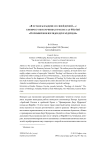
Статья научная
В статье подробно рассматривается проблема атрибуции текстов, цитируемых файласуфом ал-Фа̄ра̄бӣ в его «Книге о примирении взглядов Двух Мудрецов». Автор доказывает, что, вопреки мнению ряда современных востоковедов (П. Адамсон, Ф. Циммерманн), ал-Фа̄ра̄бӣ был хорошо знаком с vulgata известного исследователям апокрифа «Теология Аристотеля», использованного им в работе над текстом «Примирения...»; также показывается, что мыслитель спорадически обращался и к вошедшим в состав арабского аристотелевского корпуса фрагментам «Первоначал теологии» Прокла Диадоха. Отдельно обсуждается роль «Теологии» псевдо-Стагирита в становлении мистического учения восточных перипатетиков.
Бесплатно
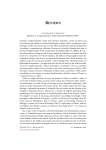
A companion to Aristotle edited by G. Anagnostopoulos, Wiley-Blackwell publishers, 2009
Рецензия
Бесплатно
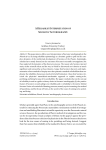
A reliabilist interpretation of Socrates’ autobiography
Статья научная
This paper aims to offer a novel interpretation of Socrates’ autobiography in the Phaedo 96-102 by using reliabilist epistemology as a heuristic guide to spell out the complex dynamics of the intellectual development of Socrates of the Phaedo . Surprisingly, scholars have mostly focused on the outcomes of Socrates’s scientific investigations, but they neglected the dynamics of the discovery process. The reason why Socrates rejected many earlier scientific ideas and the way in which he discovered new theories as much significant and noteworthy as those theories. I argue that Socrates’ discovery and implementation of new methods of inquiry meet the epistemic standards of reliabilism that emphasize the reliability of processes involved in belief-formation. I show that Socrates criticized the physicists’ materialistic-mechanistic approach to explain coming-to-be, perishing, and being because of its unreliability. The paper concludes that (a) the concept of reliability is used as a guide to theory choice in Socrates’ autobiography (b) the positive feature of Socrates’ second sailing is its reliability and (c) reliability is the motive behind Socrates’ choice of certain belief-forming processes, namely a priori reasoning, the method of hypothesis, and the theory of Forms, in the search of the cause of coming-to-be, perishing, and being.
Бесплатно
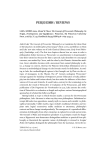
A review of: Laks, A., Most, G. W. The concept of presocratic philosophy (2018)
Рецензия
A review of: Laks, A., Most, G. W. The concept of Presocratic philosophy . Princeton University Press, 2018.
Бесплатно
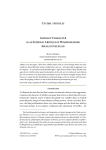
Achilles’ character as an internal critique of warmongering ideals in the Iliad
Статья научная
In this paper, I show how Achilles’ faults work as a lens through which we more readily see the problematic nature of ideals that cast war - and especially an aggressive war of conquest - in a poeticized and desirable light. I argue that in Homer’s Iliad, idealized images of war, which promise super-human glory, in the end, serve to undo and waste human life. I do not mean to say that in this archetypal war epic we find an outright critique of war. However, I argue that the Iliad holds its poeticized images of war in tension with the gruesome, life-negating violence to which these idealized representations give way.
Бесплатно
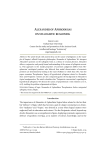
Alexander of Aphrodisias on syllogistic reasoning
Статья научная
The article deals with ancient ideas on the nature of syllogistics on the example of Empire's official Peripatetic philosopher, Alexander of Aphrodisias. We interpret Alexander's position on the syllogistic form as a theory of constant function . Alexander offers a conjunctive and purely formal understanding of the nature of syllogistic necessity. This approach to the modal properties of assertoric judgments differs from Theophrastus’ ontological position, who believed that modal characteristics of assertoric premises are determined by looking to the state-of-affairs to which they refer. Also, the paper examines Theophrastus’ legacy of hypothetical syllogisms related to Alexander. Stoic and Peripatetic versions are also compared against the background of Alexander's logical amalgamation . The article elucidates late “Peripatetic conservatism” regarding the hypothetical syllogistics. We discuss the syntax of propositional / term relations (εἰ τὸ Α, τὸ Β), tackling the problem of grammatical ellipsis .
Бесплатно
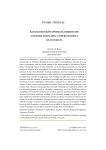
Alexander's metaphysics commentary and some scholastic understandings of automata
Статья научная
In this article, I argue that Albertus Magnus and Thomas Aquinas read a certain passage of Aristotle's Metaphysics on the nature of metaphysical curiosity in a way that is inconsistent with the earlier reading of the same passage by Alexander of Aphrodisias. The passage has to do with Aristotle's use of mechanical automata as a metaphor for kinetic mimesis in his metaphysics. The result of the variant reading of the passage in question is that these Scholastic readings emphasize universal causality as a vehicle of “wonder banishment” in metaphysics at the expense of recognizing the key metaphysical principle that Aristotle is suggesting. Such readings actually turn out to be difficult to maintain with the example of mechanical automata that Aristotle employs. I argue that the absence of the availability of Alexander's commentary to Albert and Aquinas contributes to their variant and inconsistent reading. There are three main parts and a conclusion. Part I discusses the passage from Aristotle's Metaphysics in question, which I call the thaumata passage, as well as Alexander's commentary on it. Part II discusses the unavailability of Alexander's commentary to Albert, Aquinas and their predecessors. Part III discusses the variant scholastic readings of the thaumata passage and how these readings, which take Aristotle's mechanical automata as chance occurrences result in an emphasis on wonder banishment through universal causal reasoning that is inconsistent with the example Aristotle uses in the thaumata passage. By way of conclusion I suggest that even had Alexander's commentary been available to Aquinas, he would have understood the passage as more akin to remarks on magic than to metaphysics.
Бесплатно
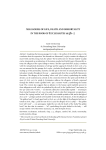
Allegories of life, death and immortality in the book of Ecclesiastes 12:5b-7
Статья научная
Analyzing the famous passage Eccl. 12:5b-7, the author of the article comes to the conclusion that the expression "the almond tree blossomed" (12:5bα) contains the allegory of man’s birth and his young years; the phrase "the locust/locust tree became loaded" (12:5bβ) can be interpreted as an indication of the mature, productive/fruitful years of human life activity; the allegory of the caper, falling to winter ("and the caper bush fell"; 12:5bγ), correlates with the metaphorical description of old age and the approach of death in Eccl. 12:1b-2. So, one can assume that the passage Eccl. 12:5bα-γ includes the allegories of man's earthly birth, making up of his personality, maturity and old age in the form of natural phenomena that take place in Judea throughout the year - approximately from the second half of January to December. The allegory of the breaking "silver cord" (Eccl. 12:6aα), symbolizing the earthly demise, can be understood as a break in the connection between the spirit and the flesh of man (cf.: Eccl. 12:7). In 12:6аβ-b, Ecclesiastes adduces the allegories of death, expressed through the broken vessels ("golden bowl", "jar", a certain "vessel"), symbolizing the human body. The context also suggests that an allusion to the human spirit implicitly present in these allegories as well, which is symbolized by olive oil (in the "golden bowl") and water (in the "jar" and in the "vessel"), - not directly called, but contextually implied - returning to their eternal Fountain (cf.: Jer. 2:13, 17:13, also: Ps. 36:10) when their temporary receptacles are broken. The "spring" and the "well" (Eccl. 12:6b) are veritable symbols of life, and in the light of Eccl. 12:7b - perhaps symbols of eternal life in the Book of Ecclesiastes. As for the allegory of "the golden bowl", it clearly goes back to Zech. 4:2-3. In the light of the allegorical picture attested in Zech., chap. 4, and the text of Eccl. 12:7b, the allegory of Eccl. 12:6aβ - "the golden bowl will crack" - can presuppose implicitly not only the death of the body/"the golden bowl", but also that its contents - "oil", symbolizing the spirit abided in the body - will merge with the "oil" of the Divine Luminary, scil., with the Spirit of God.
Бесплатно
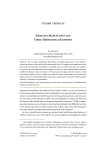
Ammianus Marcellinus and three-dimensional rainbows
Статья научная
We examine Ammianus Marcellinus' scientific digression on the rainbow, where the rainbow colors are listed in an unusual order. We suggest an explanation for the order and conclude that, according to a scientific theory current at the time, the rainbow was viewed as a three-dimensional arrangement in the sky, with colored bands positioned at different distances from the observer. This perspective aligns with the rejection of the Aristotelean rainbow theory, which is an evolution of ideas observable in its intermediate stages in Seneca’s “Natural Questions” and in the commentary on Aristotle’s “Meteorology” written by Alexander of Aphrodisias.
Бесплатно
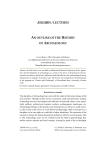
An outline of the history of archaeology
Статья научная
In this lecture, one can find an abbreviated historical trajectory of the appearance and development of archaeology as a science. The aim is to demonstrate the perceptions and biases, which have influenced and still influence the archaeological theory and practice in negative or positive ways. The lecture was prepared for the participants of the program on “Classics and Philosophy” of Novosibirsk State University (October 2018).
Бесплатно
Статья научная
The article makes an assumption about a probable reference to Petronius' Satyricon, occurring in Federico Fellini's novel A Marriage Agency (Un'agenzia matrimoniale), which is part of the anthology film Love in the City (L'amore in città, 1953) made by a group of Italian film directors. Many a time did the Italian film maker admit that he had discovered Petronius as early as his years at the lyceum in Rimini. The author of the article adduces arguments testifying to a possible influence Petronius may have had on Fellini; he draws parallels between the ancient horror-story told by a freedman, Niceros, at the feast held by Trimalchio (Sat. 61-62) and the modern story created by Federico Fellini. These parallels in the stories about werewolves (versipellis), found in Petronius' Satyricon and in Fellini's A Marriage Agency, are credible coincidences. Fellini chose the tale about a werewolf, which may have been inspired by Petronius' novel that had had a great influence on him in his green years. And the horror-story about a lycanthrope told by Niceros is undoubtedly one of the most memorable ones at the cena Trimalchionis. If the assumption in the article is true, then the story A Marriage Agency is Fellini's yet another film that, along with Satyricon, features the Petronius subject, and, what is most important, this happened half a decade before his ‘historiographic' masterpiece.
Бесплатно
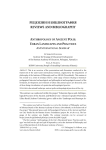
Anthropology of ancient polis: urban landscapes and practices. An international seminar
Статья обзорная
This is an overview of the presentations and discussions conducted in the framework of the same-name international seminar, organized by the department of philosophy of the Institute of philosophy and law SB RAS (Novosibirsk). This seminar is the second in a series of seminars where a wide range of issues relating to historical-pedagogical, historical-archaeological, and philosophical-anthropological research of the formation, development and evolution of urban educational spaces are discussed, each of them being a localization of a particular anthropological practice.
Бесплатно
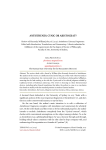
Antisthenes: cynic or aristocrat?
Рецензия
Review of: Kennedy, William John, ed. (2017) Antisthenes' Literary Fragments: Edited with Introduction, Translations, and Commentary. A thesis submitted in fulfilment of the requirements for the degree of Doctor of Philosophy. Faculty of Arts, University of Sydney. (https://ses.library.usyd.edu.au/bitstream/2123/16595/1/Kennedy_WJ_Thesis%20Final.pdf). The review deals with a thesis by William John Kennedy devoted to Antisthenes. The authors of the review are chiefly interested in the first part of the work where Kennedy is attempting to substantiate his controversial view on Antisthenes' philosophical affiliation, asserting that he had nothing to do with the Cynics and in his ethical judgment abided by traditional tenets of Athenian aristocracy. The review is focusing on those hermeneutical devices, including rather biased translations that allow the author to come to a conclusion that breaks so starkly with the standard position in modern Classical studies.
Бесплатно
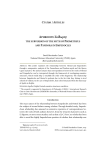
Aphrodite : the subversion of the myth of Prometheus and Pandora in Empedocles
Статья научная
This article examines the relationship between Hesiod and Empedocles through a comparative analysis of the Prometheus and Pandora myth and the Queen Cypris narrative. The author sustains that correspondences between the works of Hesiod and Empedocles can be interpreted through the framework of overlapping narrative structures, which would help to establish the order of the fragments. The relationship between Empedocles and Hesiod is polemic due to the fact that they belong to rival schools of wisdom. In the case of Empedocles, that school emanated from the Sanctuary of Apollo in Delphi.
Бесплатно
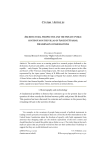
Статья научная
The article serves as a starting point for a research project dedicated to the dichotomy of private and public, and its implications and dynamics in the late Roman republic - early Empire. The primary focus is on the roman private spaces in the villas and houses of the Vesuvian archaeological area. The main methodological approach is represented by the ‘space syntax” theory of B. Hillier and the “movement as memory” theory of D. Favro developed within the logics of Spatial Turn studies, further refined by A. Russel in her works on Roman public space.
Бесплатно
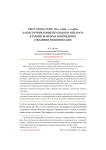
Статья научная
В статье исследуется учение византийского философа и богослова Максима Исповедника (c. 580-662) о воле и волевом акте. Анализируется группа понятий, содержание которых Максим обсуждает применительно к этапам и составляющим процесса воления. Показано, что сердцевину понятийного аппарата, на основе которого Максим, вовлеченный в христологическую полемику с монофелитами, строит свое учение о воле, составляют термины, обсуждаемые Аристотелем в «Никомаховой этике» III, 4, 1111b 4 - 7, 1113b 22. Также реконструируется учение Максима о естественной и избирательной волях человека.
Бесплатно
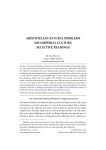
Aristotelian natural problems and Imperial culture: selective readings
Статья научная
The Natural Problems, attributed to Aristotle (but probably only partially authentic), have gained much scholarly attention in the last decades, yet a systematic study of how the collection circulated in the Graeco-Roman Empire remains a blind spot in contemporary scholarship. Indeed, the Imperial Era is a seminal period for the history of the text, not just as a conduit between Aristotle and the Middle Ages - which in itself is essential for explaining the subsequent Arabic and Latin uptake of the Problems more clearly - but also for the wealth of sources and testimonies it offers about the collection’s ancient readership and concrete use. The evidence shows that the collection sparked much debate among a range of ancient philosophers, doctors, sophists and scholars, both Greeks and Romans. This paper provides a selection of readings representative of the different socio-intellectual milieus in which the Problems circulated and the different agendas that it served.
Бесплатно
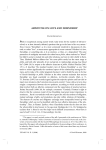
Aristotle on love and friendship
Статья научная
David Constant (Brown University, Providence, USA) presents a small paper entitled "Aristotle on Love and Friendship," in which he shows that, contrary to the opinion of many ancient scholars, the term philia in Aristotle means selective and effective relations between people, and not ties like kinship, conditioned by reciprocal obligations and not assuming an effective element as an essential characteristic. In addition, the author solves the ambiguity problem of the word philia, which can mean both "love" and mutual affection, characteristic of friendship.
Бесплатно
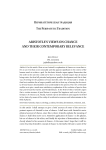
Aristotle’s views on chance and their contemporary relevance
Статья научная
In this article I first set out Aristotle's explanation of chance as a term that refers to an event that occurs unusually and that appears significant in the context of the human search to achieve a goal. On this basis Aristotle argues against Democritus that the order in the universe could not be due to chance. Aristotle argues that all natural beings strive for their full potential and greatest possible development, and this is their way of striving for the goodness of God. And they strive for survival and to remain in their best condition for as long as possible, and this is their way of striving for the eternity of God. Chance abnormalities occur accidentally in this process. This view of Aristotle enables us to give a much more satisfactory explanation of the evolution of species than that put forward by Darwin and Neodarwinians. In the field of ethics Aristotle argues that a certain measure of good fortune is required for happiness and even for the performance of virtuous acts. Finally, Aristotle rejects determinism and supports his belief in free choice by means of the reality of accidental occurrences and indeterminism in the field of physics
Бесплатно
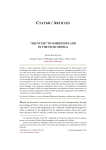
Ars vitae in iamblichus and in the stoic Seneca
Статья научная
Seneca expounds a theory of therapy and teaching with the ultimate goal of self knowledge and wisdom. Some of his techniques are based on Pythagorean principles or derive ideas from them, among them the focused and constant ascesis of self control. Iamblichus in De Vita Pythagorica exhibits great interest on the fact that mans inherent abilities along with the aid of proper education suffice for his attainment of wisdom. For both thinkers, knowledge through practice is considered to be one of the major philosophical demands in the perspective of an ars vitae. The human being has to canalize himself into the modeling of a new way of living, an art of living which will contribute decisively to the fulfillment of his teleology, to his perpetual eudaimonia (bene vivere). The admittance of individual differences in peoples ability to reform themselves only signifies the more intense effort of the teacher towards a purification of their intellect and greater engagement of the individuals volition but not their inability for correction.
Бесплатно

